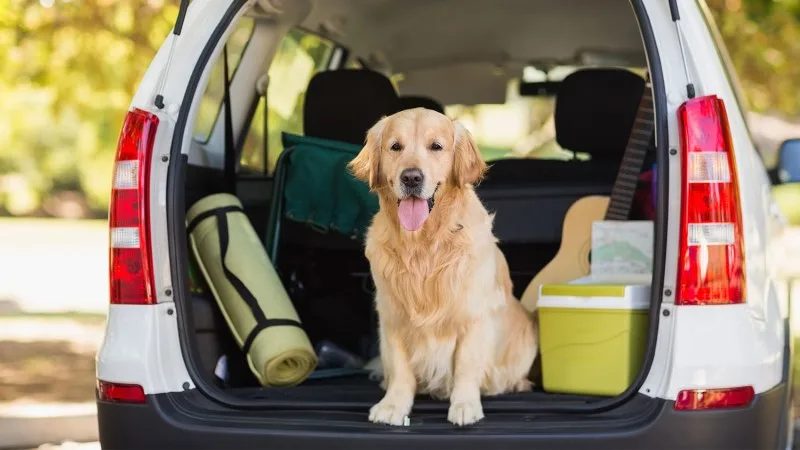Reduce Your Dog's Motion Sickness in Cars
Learn about the various ways you can reduce dog car sickness, motion sickness, and dog nausea when traveling with your canine companion in the car.

Family road trips just aren’t the same without a dog in tow. For some dogs, however, riding in cars is anything but pleasant. Puppies, in particular, are often susceptible to nausea, anxiety, and other symptoms of motion sickness when traveling in a car.
If you've ever asked yourself, "Can dogs get car sick?", the answer is a big yes. That's because the dog ear, much like the human ear, contains tiny bones and other components that help promote balance and discourage conditions like vertigo and motion sickness. Young dogs -- like young children -- lack many of these necessary structures. As their ears form with age, most dogs and children eventually “outgrow” their susceptibility to motion sickness.
While motion sickness and dog car sickness are rarely lifelong ailments, they are still major concerns for new pet owners in particular. Even mature canines may experience symptoms of car sickness if they’ve come to associate driving with sickness and high stress levels. Fortunately, dog lovers have many tools at their disposal for addressing dog motion sickness and making the car a low-stress environment for everyone.
Signs of Dog Motion Sickness
It’s often difficult to recognize the early signs of motion sickness in dogs. Watch out for these warning signs when traveling with your dog:
Diarrhea and vomiting
Excessive drooling and lip smacking
Lethargy or sluggishness
Pacing or other repetitive behavior
Whining
Yawning
Recognizing the signs quickly is key for both reducing your dog’s stress level and protecting your car’s interior. If you think your dog is about to vomit, safely bring the car to a stop to comfort them.
Taking Precautions
With some careful planning, dog owners can reduce the stress of car rides, dog nausea, and the likelihood that their new puppy will experience bouts of motion sickness.
Limit Meals
One of the easiest ways to avoid mishaps is to limit meals before car rides. Dr. Mark Olcott, a Maryland-based vet, suggests avoiding food and treats within two hours of hitting the road. During long car rides, Olcott advises pet owners to only bring along small portions of food and plan meals around pit stops.
Face Forward
Dogs run a higher risk of experiencing motion sickness and nausea while traveling if they’re facing backward, sitting toward the rear of the car, or moving too much throughout the trip. Certain dog seat belts can reduce symptoms by guaranteeing that dogs face forward and remain close to the front of the car.
Reduce Stress
Motion sickness (especially the anxiety-induced kind) can be a vicious cycle. Negative associations and experiences may leave dogs struggling to stay calm even during brief car rides. Experts suggest creating more positive associations to make the car a pleasant space.
Bring Along Special Toys and Treats
This could involve bringing along your dog's favorite toys and chews or only making certain treats available to your dog when they travel, so they begin to associate the car with pleasure rather than anxiety. Over time, they’ll learn to love car trips and begin looking forward to drives.
Crack the Window
For some dog owners, making the car more pleasant is as simple as cracking the window and letting in some fresh air. The pet health experts at the American Kennel Club note that this will normalize the air pressure in the car and may reduce symptoms. Good ventilation and cool temperature can have similar effects as well.
Natural Remedies
In addition to fresh air and familiar objects, many pet owners have had success with natural anti-nausea remedies. Ginger is a popular over-the-counter nausea treatment, but that doesn’t mean your dog should lap up a bowl of ginger ale. Consider administering ginger capsules, which are available at most health food stores and can help address symptoms, provided they don’t include dangerous artificial sweeteners (like xylitol).
Other popular remedies include diffusing small amounts of lavender before car rides and feeding dogs certain homeopathic favorites likenux vomica. Keep in mind, however, that evidence to support the use of homeopathy is limited. Always discuss natural remedies with your veterinarian before administering them, follow all necessary precautions, and monitor your pet’s response closely.
Talk to Your Vet
Treating motion sickness and related anxiety is a process of trial and error. Work alongside your veterinarian to develop a custom treatment plan that will address your dog’s unique needs. If necessary, they may suggest a prescription to ensure the whole family can comfortably enjoy road trips. Also, don’t forget to talk to a sales agent about AKC Pet Insurance at 866-725-2747. Pet insurance may help with reimbursement of costs on both diagnosis and management of unexpected illnesses in dogs and cats.



